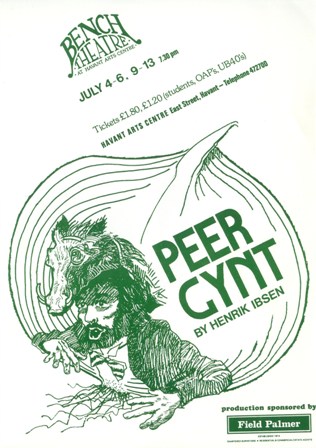46. (takes an onion and peels it layer by layer)
In the play Peer Gynt by Henrik Ibsen the character Peer Gynt uses the onion and the peeling of it as a metaphor.
In Act V, scene 5, the onion plays a very significant role.
"Why, you old shyster, you knew you were never an Emperor; an onion, that's you."
Read the whole play in English here.
Read the essay The Concept of "Self" in Some Plays by Ibsen, Strindberg, Beckett, Osborne, and Pinter.
"Centring on Peer Gynt's onion as a symbol of modern man's "dissolved" self, this thesis is a study of the changing concept of "self" and its effect on the development of dramatic technique."
Read a review of a the play here.
"Toward the end of Ibsen's Peer Gynt a saga of self under siege, the title character is discovered peeling an onion, finding in the layers of that humble vegetable a symbol for the chapters of an eventful life."
"Mr. Doyle (director) doesn't do spectacle. His approach is the same one that Peer applies to the onion: Keep stripping until you find the core."
"By the time he comes to his tête-à-tête with the onion, we may not feel like weeping, as Peer does (it's an onion, remember)."
The Russian Composer Alfred Schnittke made a ballet from the play.
Listen to the onion scene here.
Read another article about a performance of the play here. "This scene, called the "onion scene" by the actors, originally involved the actors throwing around an onion as they debated, each taking a turn peeling off a layer as they dissected the character they played together. The actors then entered the house and surrounded the audience as they continued this debate about morality. The onion was eventually omitted, though, in order to reduce the risk of audience injury."
"Peel away the layers of a man like an onion and what do you find in the middle?"
Watch an (somewhat mysterious) analysis here.
"Too many people misunderstand the layers of an onion. In this Boles.tv live stream highlight, David Boles helps explain how, and why, the Peer Gynt peeling onion analogy is so often misused in mainstream culture."


